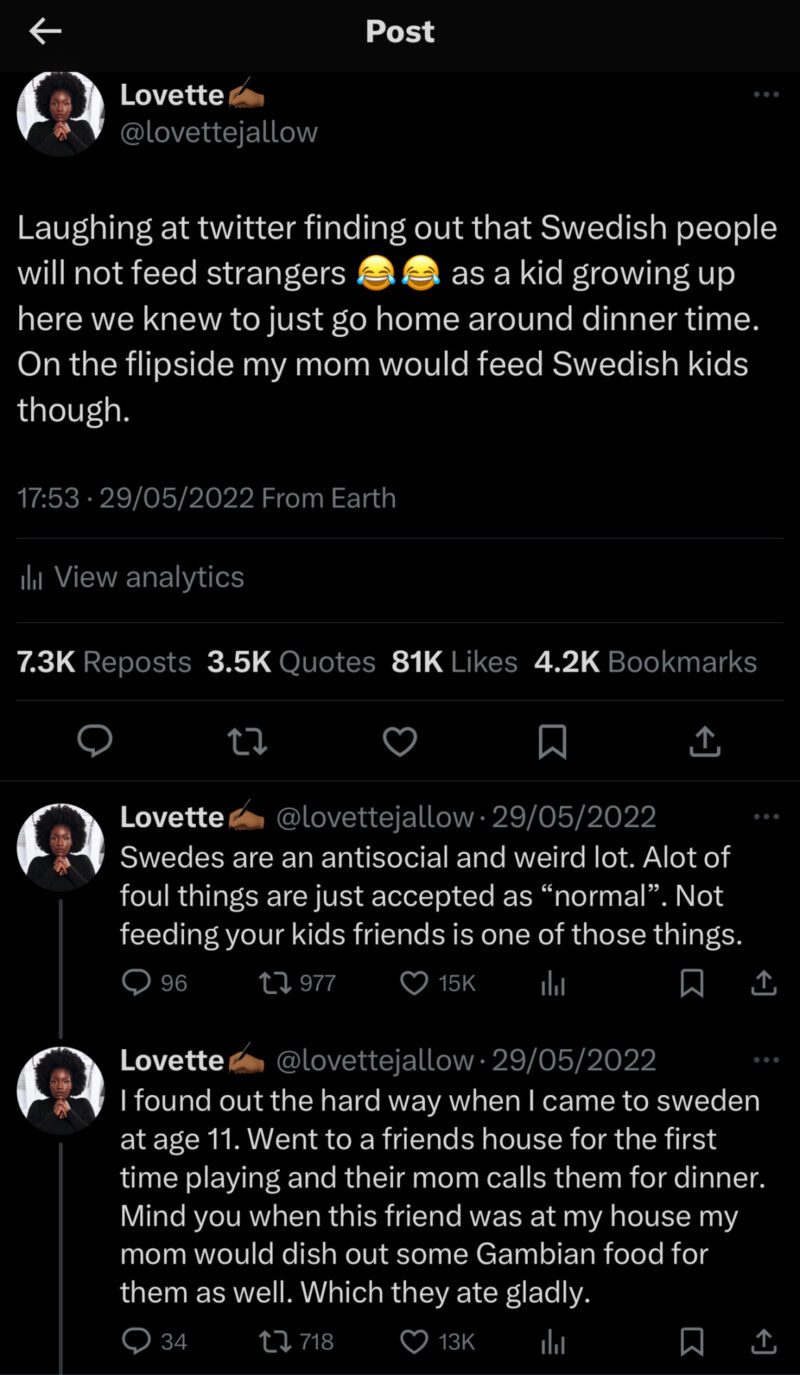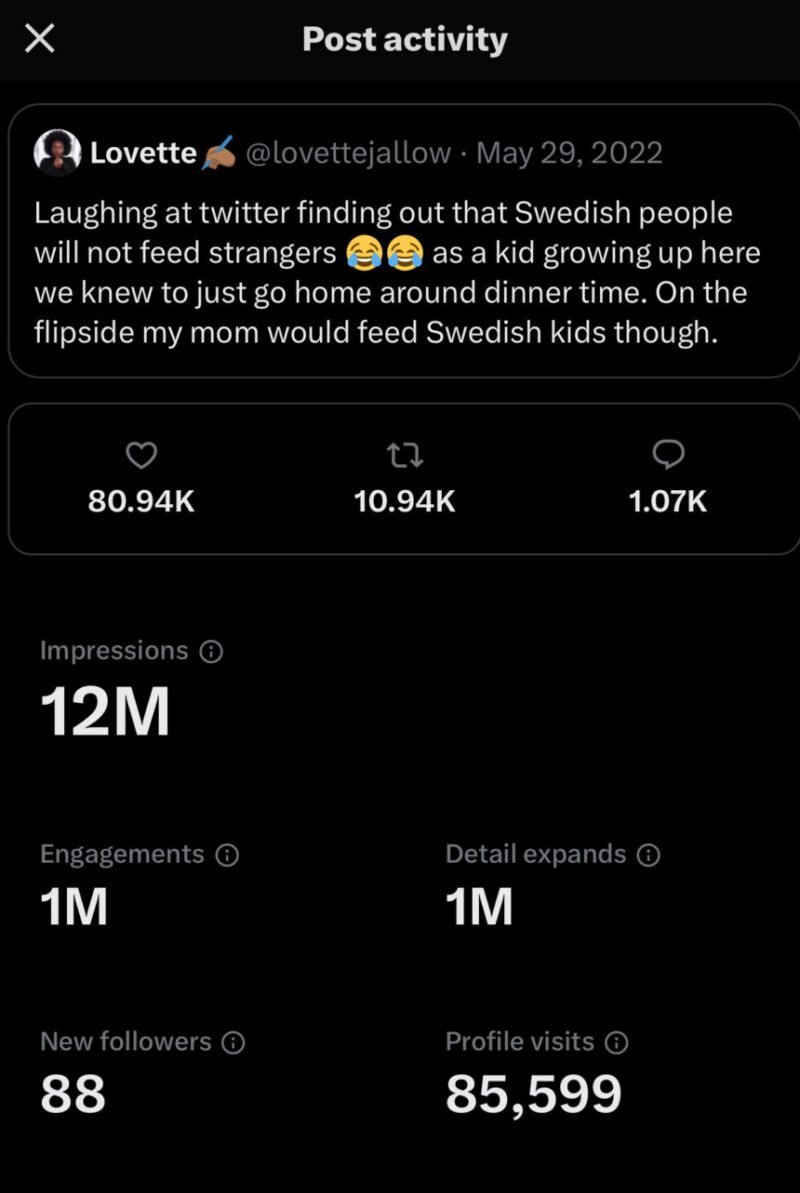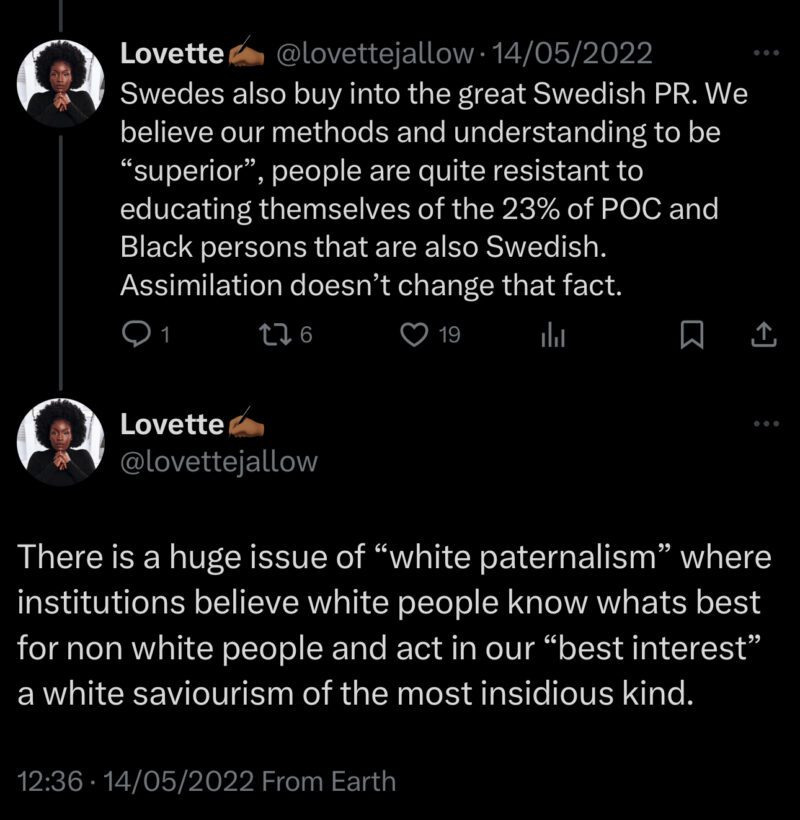#Swedengate: How Lovette Jallow “Allegedly” Started a Swedish Social Media Takedown

Lovette Jallow and the Hungry Kids V. the People of Sweden in #Swedengate
In late May 2022, a simple tweet I posted about a curious Swedish tradition unexpectedly set off a global social media storm. My tweet, reflecting on how Swedish families often don’t offer food to guests during mealtime, quickly went viral and sparked a widespread discussion under the hashtag #Swedengate.
The Initial Tweets
It all started with my innocent observation on Twitter:
“Laughing at Twitter finding out that Swedish people will not feed strangers 😂😂 as a kid growing up here we knew to just go home around dinner time. On the flipside my mom would feed Swedish kids though.”
This was followed by:
“Swedes are an antisocial and weird lot. A lot of foul things are just accepted as ‘normal.’ Not feeding your kids’ friends is one of those things.”
And then:
“I found out the hard way when I came to Sweden at age 11. Went to a friend’s house for the first time playing and their mom calls them for dinner. Mind you, when this friend was at my house my mom would dish out some Gambian food for them as well. Which they ate gladly.”
Finally, I shared:
“As I trailed behind my friend heading for the dinner table, the mom sternly told me I was allowed to wait and play with the toys in my friend’s room until dinner was done. Let me just say, the Swedes are not well at all.”

These tweets resonated deeply with many, prompting a flood of responses and shares. Before I knew it, the tweets had reached a global audience, with over 12 million views and more than 10,000 reposts with comments. This phenomenon not only sparked a conversation about Swedish customs but also brought to light underlying issues of racism and exclusion in Sweden. Nothing new to me (or many) as I had already chronicled some of these strange cultural norms in my book ”främling i vita rum”

The Podcast Interview
In an interview with Ben Brock Johnson and Amory Sivertson for their podcast titled “Swedengate: An international social media meatball-slinging campaign… turned national reckoning,” I discussed the origins and impact of #Swedengate.
Amory: “Every media outlet, until we got to talk to her. This is Lovette Jallow. And it’s not lost on her that she hasn’t been credited until now because, as she explains it.”
Lovette: “That is the issue of being a Black woman. If I was a white Swede that had used the hashtag Swedengate first, there would be acknowledgment for that.”
Ben: “Lovette thinks a lot about hypotheticals such as this. She’s a diversity, equity, and inclusion consultant who’s worked with companies like Spotify and Facebook…”
Amory: “…an activist and the author of two books about what it means to be Black in Sweden…”
Lovette: “…and on my spare time, apparently I start viral threads on social media without knowing about it.”
Media Coverage and Public Response
The phenomenon of #Swedengate garnered widespread media attention, further amplifying the conversation. A New York Times article by Lola Akinmade Åkerström, titled “A Social Media Takedown Is a Blessing in Disguise for Sweden,” provided a critical perspective on the situation.
Lola Akinmade Åkerström: “On a warm day in late May, life was humming along, punctuated by fika breaks, with pastries, coffee, and conversation, when Sweden found itself thrust into the center of a global Twitter storm. Usually known for its generous social safety nets, latte papas, and midsummer frolics, the Scandinavian nation was trending — and not in a good way.”
She continued:
Lola Akinmade Åkerström: “The critical gaze of social media users around the world was suddenly trained on the curious Swedish tradition of not automatically offering food to guests — including children invited over for play dates — while the host family sits down to eat. It started with a Reddit user who described a memory of being left in a friend’s bedroom while the family ate dinner, and it escalated into Swedengate, a hashtag and multilayered takedown of a nation more accustomed to praise than mockery.”
The Broader Conversation
The viral hashtag spurred a broader conversation about Swedish culture, hospitality, and underlying social issues. While some Swedes challenged or corroborated the tradition based on their childhood experiences, others used the platform to discuss more profound issues such as xenophobia and racism.
From an article by Adam Manno for the Daily Beast titled “#Swedengate Explodes on Twitter as Americans Express Shock Over Swedes’ Refusal to Feed Guests“:
The cultural lesson quickly grew into an internet-wide venting session, with multiple people recalling childhood memories of sitting alone in a playroom while their friend sauntered down to the dining room for a plate of köttbullar without them.
Personal Backlash
As the originator of the hashtag, I faced significant backlash, particularly from xenophobic elements within Sweden. This response was not unexpected, given the sensitive nature of the issues discussed.
Lovette: “It wasn’t unusual for kids to call me a monkey or to ask me if my skin is brown because I smeared myself with poop, you know, things like that.”
In her New York Times article, Lola Akinmade Åkerström highlighted the xenophobic backlash I received:
Lola Akinmade Åkerström: “As a Black woman and author, she confirmed the xenophobic backlash I received and noted that it is expected every time someone speaks an uncomfortable truth, even with humor, about Sweden.”
Despite the backlash, I remain committed to fostering an open and honest dialogue about these issues. The viral thread has opened many eyes to the complexities of Swedish society, highlighting both its strengths and its areas in need of improvement.
Conclusion: Reflecting on #Swedengate

The #Swedengate phenomenon underscored the power of social media in bringing diverse perspectives to light and fostering global discussions. It highlighted the importance of acknowledging and addressing cultural and racial issues openly and honestly. As we continue to navigate these conversations, it’s crucial to listen to and amplify the voices of those who have been historically marginalized.
Additional Insights from Lovette Jallow’s TED Talk:

In my TED Talk from 2018 titled “Normalizing Silence in Swedish Society,” I addressed the systemic issues underlying Swedish society’s tendency to prioritize a positive image over addressing real issues. I have tweeted over the years about this as well:

“This is the Swedish PR system working overtime. We top a lot of positive lists, but whose experiences do they take into account? Certainly not the 33.3% of the population with one or both parents born outside Europe.”
I also highlighted the challenges of white paternalism and the shallow analysis often applied to diversity, equity, and inclusion efforts in Sweden:
“We still have huge issues with white paternalism, where institutions believe white people know what’s best for non-white people and act in our ‘best interest.’ DEI is failing in Sweden because now white women lead that role with an analysis more shallow than a puddle after a 2-minute drizzle. This is a self-serving white saviorism of the most insidious kind.”
Continuing the Dialogue
As we move forward, let us individually and collectively remain committed to amplifying diverse voices, challenging systemic injustices, and creating a more equitable society for all.
No one is voiceless some are silenced when they speak to the point of threats and others never pass the microphone.


